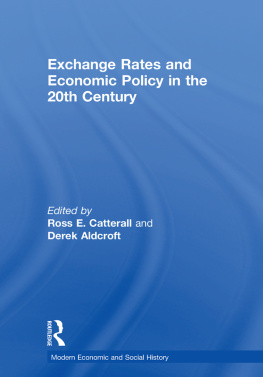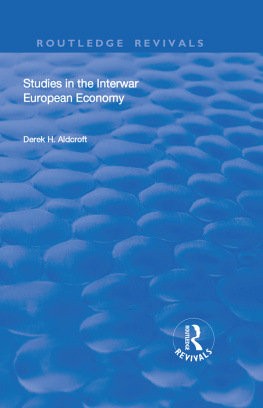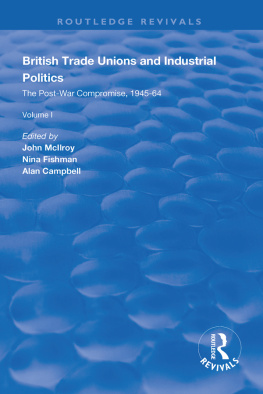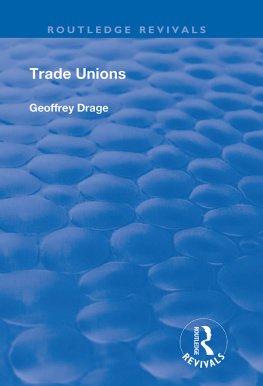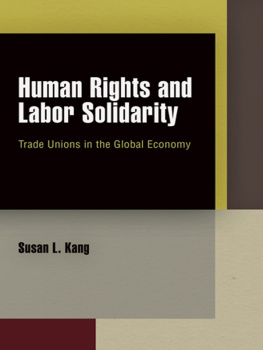Trade Unions and the Economy: 18702000
Modern Economic and Social History Series
General Editor: Derek H. Aldcroft
Titles in this series include:
Studies in the Interwar European Economy
Derek H. Aldcroft
Whatever Happened to Monetarism?
Economic Policy-Making and Social Learning in the United Kingdom
since 1979
Michael J. Oliver
Disillusionment or New Opportunitiesi
The Changing Nature of Work in Offices, Glasgow 18801914
R. Guerriero Wilson
Raleigh and the British Bicycle Industry:
An Economic and Business History, 18701960
Roger Lloyd-Jones and M. J. Lewis
Battles for the Standard:
Bimetallism and the Spread of the Gold Standard, 18701914
Edward R. Wilson
The British Footwear Industry
Peter R. Mounfield
Trade Unions and the Economy: 18702000
Derek H. Aldcroft and Michael J. Oliver
The British Electronics Industry:
Innovation, Markets and Performance, 193097
John F. Wilson
Gales: A Study in Brewing, Business and Family History
Barry Stapleton and James H. Thomas
Exchange Rate Regimes and Economic Policy in the Twentieth Century
edited by Ross Catterall and Derek H. Aldcroft
First published 2000 by Ashgate Publishing
Published 2017 Routledge
2 Park Square, Milton Park, Abingdon, Oxon OX14 4RN
711 Third Avenue, New York, NY 10017, USA
Routledge is an imprint of the Taylor & Francis Group, an informa business
Copyright Derek H. Aldcroft and Michael J. Oliver, 2000
The authors have asserted their moral right under the Copyright, Designs and Patents Act, 1988, to be identified as the authors of this work.
All rights reserved. No part of this book may be reprinted or reproduced or utilised in any form or by any electronic, mechanical, or other means, now known or hereafter invented, including photocopying and recording, or in any information storage or retrieval system, without permission in writing from the publishers.
Notice:
Product or corporate names may be trademarks or registered trademarks, and are used only for identification and explanation without intent to infringe.
British Library Cataloguing in Publication Data
Aldcroft, Derek H. (Derek Howard), 1936.
Trade Unions and the Economy : 18702000.
(Modern Economic and Social History)
1. Trade-unions Great Britain. 2. Trade-unions Great
Britain History 20th century. 3. Trade-unions Great
Britain Political activity.
I. Title. II. Oliver, Michael J.
331.8809410904
Library of Congress Cataloging-in-Publication Data
The Library of Congress Control Number is preassigned as: 00104301.
Typeset in Sabon by Manton Typesetters, Louth, Lincolnshire.
ISBN 13: 978-1-85928-370-7 (hbk)
Modern Economic and Social History Series General Editors Preface
Economic and social history has been a flourishing subject of scholarly study during recent decades. Not only has the volume of literature increased enormously but the range of interest in time, space and subject matter has broadened considerably so that today there are many sub-branches of the subject which have developed considerable status in their own right.
One of the aims of this new series is to encourage the publication of scholarly monographs on any aspect of modern economic and social history. The geographical coverage is world-wide and contributions on non-British themes will be especially welcome. While emphasis will be placed on works embodying original research, it is also intended that the series should provide the opportunity to publish studies of a more general and thematic nature which offer a reappraisal or critical analysis of major issues of debate.
Derek H. Aldcroft
Manchester Metropolitan University
Despite the plethora of books and articles on various aspects of British trade union history, there has been very little continuous study of the effects of union activities in terms of economic performance. This study is a modest attempt to fill the gap in the literature. We hope that it will stimulate further work in this important field, especially as we have not been able to cover every aspect of the subject.
We should like to thank Professor Derek Leslie of Manchester Metropolitan University for kindly reading parts of the text and offering valuable suggestions for improvement. Thanks must also be extended to the following: Professor William Brown (University of Cambridge) for his suggestions; Lucy McKeever (University of Durham) for providing some of the data; Elena Nikolova at Gettysburg College for research assistance; Dr Gregor Gall (University of Stirling) for allowing us a preview of his article on union de-recognition; Alfie Windsor for his technical expertise and all the library staff at Gettysburg College, the University of Leicester, Manchester Metropolitan University and the University of Sunderland for their bibliographic help.
Derek H. Aldcroft
Michael J. Oliver
December 1999
What do unions do and why do they do it? Are they profit-maximisers for the benefit of their collective membership at the expense of the rest of society, in other words a public bad; or do they, as we are led to believe the postwar German trade unions do, have some higher goal for the welfare of society as a whole, and so may be considered to be a public good? There is probably no simple or single answer to these questions, nor to the question as to what it is that unions maximise, if anything. In their economic analysis of trade unions, Hirsch and Addison (1986, 40) provided a suitably broad and iconoclastic statement of intent: While much of what unions do is inefficient and leads to results divergent from perfectly competitive outcomes, unions also provide a collective voice for their members and facilitate changes in the work environment consistent with economic efficiency.
Yet notwithstanding the voluminous literature on trade unions and industrial relations, there has been relatively little written on how unions impacted on the economy and the business world; at least not over the course of time since their inception, though for the post-war period there has been much research work by economists, principally in article form. This volume therefore seeks to fill a lacuna from the time of the development of a mass labour movement in the latter nineteenth century through to the present day.
Trade unions in Britain have had a somewhat chequered history, waxing and waning over time. The first modern unions of any note were the craft societies of the mid-Victorian years; they were regarded as respectable if somewhat staid and exclusive organisations, since they catered only for a very small proportion of the labour force and were as much concerned with benefit and relief provision as they were with purely trade matters, and some continued along such lines even down to the end of the century. It was not until the 1870s that numbers began to grow rapidly, and in time newer types of unions emerged to cater for less skilled or unskilled workers, and even a few that recruited white-collar employees. Progress was, however, somewhat erratic since there were periodic setbacks to recruitment, but in the longer term they gained considerably in strength. By the eve of the First World War there were over four million members distributed among some 1,250 societies, and the average density was not far short of one quarter. During this period of expansion there had been some epic battles with employers in many of the basic industries, not all of which had resulted in victory for the unions by any means. Despite these bitter struggles, unions and collective bargaining had come to be accepted by many employers, albeit reluctantly in some cases.




